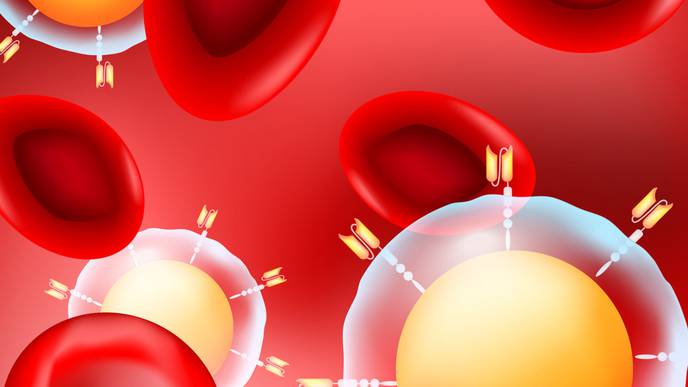Promising Target for CAR T Cells Helps Cancer Trick the Immune System

11/27/2023
Tumors trick CAR T cells
“We expected two different tumors with the exact same level of antigen [GRP78] expression to be affected by the CAR T–cell therapy in the same way, but they aren’t,” said first author Jorge Ibanez, Ph.D., St. Jude Department of Bone Marrow Transplantation and Cellular Therapy. “Instead, we found certain tumor cell types were altering T-cell activation and T-cell GRP78 expression.”
Ibanez found that resistant tumor cell types were altering the CAR T cells. The tumor cells caused the GRP78-targeted CAR T cells to express GRP78 on the CAR T cells’ surface. The more GRP78 on the T cells, the less active they became, reducing their cancer-killing activity. In addition, CAR T cells that remained active targeted and killed their counterparts expressing GRP78 on their surface.
In effect, the resistant tumors were conning the CAR T cells. These tumors raised the flag of GRP78, saying, “I’m here,” and then convinced the approaching T cells to raise their own GRP78 flag. This tricked the CAR T cells into killing each other or giving up, leaving the tumor relatively unscathed.
Through these experiments, the St. Jude group unveiled the tricky biology of GRP78. The protein remains a tantalizing target, given its presence on many difficult-to-treat tumor types. Findings show scientists will need to expand their understanding of this newfound interaction with T cells to make viable GRP78-targeted immunotherapies. Still, if they can, these CAR T cells may be broadly applicable across a broad range of tumor cell types.
“We always need to find new targets to improve cancer treatment,” Krenciute said. “What we found from a biological perspective is that GRP78 has potential but is different from previous cancer-associated molecules. We showed that as scientists develop the next generation of CAR T–cell therapies, we need to recognize that not all targets are equal.”
Authors and funding
The study’s other authors are Nikhil Hebbar, Unmesha Thanekar, Zhongzhen Yi, Haley Houke, Meghan Ward, Chris Nevitt, Liqing Tian, Stephen Mack, Heather Sheppard and Jason Chiang, all of St. Jude.
The study was supported by grants from the National Institutes of Health (NIH) (P01CA096832 and R50CA211481), National Cancer Institute (P30CA021765), ChadTough Defeat DIPG Foundation (R01NS122859), American Brain Tumor Association (ABTA) Basic Research Fellowship supported by Humor to Fight the Tumor and ALSAC, the fundraising and awareness organization of St. Jude.

Facebook Comments